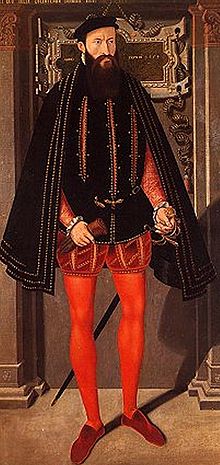Loading AI tools
Duke of Jülich-Cleves-Berg from 1539 to 1592 From Wikipedia, the free encyclopedia
William of Jülich-Cleves-Berge (William I of Cleves, William V of Jülich-Berg) (German: Wilhelm der Reiche; 28 July 1516 – 5 January 1592) was a Duke of Jülich-Cleves-Berg (1539–1592). William was born in and died in Düsseldorf. He was the only son of John III, Duke of Jülich-Cleves-Berg, and Maria, Duchess of Jülich-Berg.[1] William took over rule of his father's estates (the Duchy of Cleves and the County of Mark) upon his death in 1539. Despite his mother having lived until 1543, William also became the Duke of Berg and Jülich and the Count of Ravensberg.
| William the Rich | |
|---|---|
 Portrait c. 1554 | |
| Duke of Jülich-Cleves-Berg | |
| Reign | 6 February 1539 – 5 January 1592 |
| Predecessor | John III |
| Successor | Johann Wilhelm |
| Born | 28 July 1516 Düsseldorf, Duchy of Berg |
| Died | 5 January 1592 (aged 75) Düsseldorf, Duchy of Berg |
| Burial | Collegiate Church of St. Lambertus, Düsseldorf |
| Spouses | |
| Issue | Marie Eleonore, Duchess of Prussia Anna, Countess Palatine of Neuburg Magdalene, Countess Palatine of Zweibrücken Karl Friedrich of Jülich-Cleves-Berg Sibylle, Margravine of Burgau Johann Wilhelm, Duke of Jülich-Cleves-Berg |
| House | La Marck |
| Father | John III, Duke of Cleves |
| Mother | Maria, Duchess of Jülich-Berg |

William's humanistic education was headed by Konrad Heresbach.[2] William in turn built a humanistic gymnasium in Dusseldorf in 1545.[2] He attempted to uphold the Erasmian church, but did little to stop Lutheranism from spreading through the populace.[2] After 1554, William appointed a Lutheran preacher to educate his sons.[2]
From 1538 to 1543, William held the neighbouring Duchy of Guelders, as successor of his distant relatives, the Egmond dukes. Emperor Charles V claimed this duchy for himself as the dukes had sold their right of heritage, and William tried to hold on to it. He made a treaty with the King of France and married Jeanne d'Albret, and with this backup dared to challenge the Emperor. All too soon he learned that the French did not lift a finger to help him, and he was overwhelmed and had to surrender. In accordance with the Treaty of Venlo (1543) that was the result of this war, Guelders and the County of Zutphen were transferred to Charles V, Holy Roman Emperor, combining them with the Habsburg Netherlands.
William then tried to strengthen his inherited territories and launched an impressive development project for the most important cities. The three duchies all got new main fortresses as major strongpoints, for the older medieval fortifications had proved to be no match against the Imperial artillery. The cities of Jülich, Düsseldorf and Orsoy became fortresses for the duchies of Jülich, Berg and Cleves respectively, and Jülich and Düsseldorf were turned into impressive residences. For this task, the renowned Italian architect Alessandro Pasqualini from Bologna was hired, who had already made some impressive display of his craft in the Netherlands. He made the plans for the fortifications and palaces, of which some traces still remain, especially at Jülich where the citadel (built 1548–1580) is a major landmark, with parts of the Renaissance palace still standing.
William's sister Anne of Cleves was, for six months, the fourth wife of King Henry VIII of England.
William married Jeanne d'Albret (1528–1572), heiress of Navarre as the daughter of King Henry II of Navarre and his wife Margaret of Valois-Angoulême, on 14 June 1541 when she was just 12 years old, but this political marriage was later annulled by papal dispensation on 12 October 1545.[2]
William married Maria of Austria (1531–1581), daughter of Ferdinand I, Holy Roman Emperor,[2] and Anna of Bohemia and Hungary, on 18 July 1546 and they had the following children:

| Ancestors of William, Duke of Jülich-Cleves-Berg | ||||||||||||||||||||||||||||||||||||||||||||||||||||||||||||||||||||||||||||||||||||||||||||||||||||||||||||||||||||||||||||||||||||||||||||||||||||||||||||||||||||||||||||||||||||||||||||||||||||||||||||||||||||||||||||||||||||||||||||||||||||||||||||||||||||||||||||||||||||||||||||||||||||||||||||||||||||||||||||||||||||||||||||||||||||||||||||||||||||||||||||||||||||||||||||||||||||||||||||||||||||||||||||||||||||||||||||||||||||||||||||||||||||||||||||||||||||||||||||||||||||||||||||||||||||||||||||||||||||||||||||||||||||||||||||||||||||||||||||||||||||||||||||||||||||||||||||||||
|---|---|---|---|---|---|---|---|---|---|---|---|---|---|---|---|---|---|---|---|---|---|---|---|---|---|---|---|---|---|---|---|---|---|---|---|---|---|---|---|---|---|---|---|---|---|---|---|---|---|---|---|---|---|---|---|---|---|---|---|---|---|---|---|---|---|---|---|---|---|---|---|---|---|---|---|---|---|---|---|---|---|---|---|---|---|---|---|---|---|---|---|---|---|---|---|---|---|---|---|---|---|---|---|---|---|---|---|---|---|---|---|---|---|---|---|---|---|---|---|---|---|---|---|---|---|---|---|---|---|---|---|---|---|---|---|---|---|---|---|---|---|---|---|---|---|---|---|---|---|---|---|---|---|---|---|---|---|---|---|---|---|---|---|---|---|---|---|---|---|---|---|---|---|---|---|---|---|---|---|---|---|---|---|---|---|---|---|---|---|---|---|---|---|---|---|---|---|---|---|---|---|---|---|---|---|---|---|---|---|---|---|---|---|---|---|---|---|---|---|---|---|---|---|---|---|---|---|---|---|---|---|---|---|---|---|---|---|---|---|---|---|---|---|---|---|---|---|---|---|---|---|---|---|---|---|---|---|---|---|---|---|---|---|---|---|---|---|---|---|---|---|---|---|---|---|---|---|---|---|---|---|---|---|---|---|---|---|---|---|---|---|---|---|---|---|---|---|---|---|---|---|---|---|---|---|---|---|---|---|---|---|---|---|---|---|---|---|---|---|---|---|---|---|---|---|---|---|---|---|---|---|---|---|---|---|---|---|---|---|---|---|---|---|---|---|---|---|---|---|---|---|---|---|---|---|---|---|---|---|---|---|---|---|---|---|---|---|---|---|---|---|---|---|---|---|---|---|---|---|---|---|---|---|---|---|---|---|---|---|---|---|---|---|---|---|---|---|---|---|---|---|---|---|---|---|---|---|---|---|---|---|---|---|---|---|---|---|---|---|---|---|---|---|---|---|---|---|---|---|---|---|---|---|---|---|---|---|---|---|---|---|---|---|---|---|---|---|---|---|---|---|---|---|---|---|---|---|---|---|---|---|---|---|---|---|---|---|---|---|---|---|---|---|---|---|---|---|---|---|---|---|---|---|---|---|---|---|---|---|---|---|---|---|---|---|---|---|---|---|---|---|---|---|---|---|---|---|---|---|---|---|---|---|---|---|---|---|---|---|---|---|---|---|---|---|---|---|---|---|---|---|---|---|---|---|---|---|---|---|---|---|---|---|---|---|---|---|---|---|---|---|---|---|---|---|---|---|---|---|---|---|---|---|---|---|---|---|---|---|---|---|---|---|---|---|---|---|---|---|---|---|---|---|---|---|---|---|---|---|---|---|---|
| ||||||||||||||||||||||||||||||||||||||||||||||||||||||||||||||||||||||||||||||||||||||||||||||||||||||||||||||||||||||||||||||||||||||||||||||||||||||||||||||||||||||||||||||||||||||||||||||||||||||||||||||||||||||||||||||||||||||||||||||||||||||||||||||||||||||||||||||||||||||||||||||||||||||||||||||||||||||||||||||||||||||||||||||||||||||||||||||||||||||||||||||||||||||||||||||||||||||||||||||||||||||||||||||||||||||||||||||||||||||||||||||||||||||||||||||||||||||||||||||||||||||||||||||||||||||||||||||||||||||||||||||||||||||||||||||||||||||||||||||||||||||||||||||||||||||||||||||||
Seamless Wikipedia browsing. On steroids.
Every time you click a link to Wikipedia, Wiktionary or Wikiquote in your browser's search results, it will show the modern Wikiwand interface.
Wikiwand extension is a five stars, simple, with minimum permission required to keep your browsing private, safe and transparent.